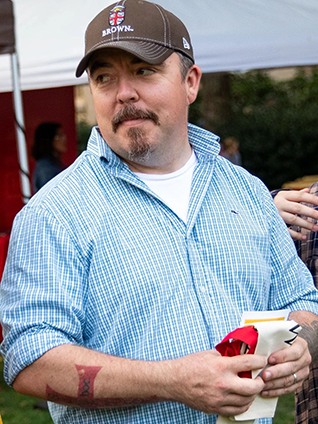PROVIDENCE, R.I. [Brown University] — In March 2021, when 41-year-old U.S. Army veteran Brehan Brady marched through Brown’s Van Wickle Gates with fellow new students, it was a moment like no other.
“I know it's a bit cliche, but walking through the Van Wickle Gates and participating in the tradition that marks the beginning of one's time at Brown was the big ‘This is really happening!’ moment for me,” said Brady, a transfer student who is now a junior concentrating in German studies with plans to declare a second concentration in history. “Sometimes it seems like every day is a series of ‘pinch me’ moments.”
Brady, who lives in Westerly, Rhode Island, with his family, is a self-described working-class kid from Pawtucket. With two tours in Iraq as a U.S. Army infantryman in the 10th Mountain Division and the 101st Airborne, he is also one among a growing presence of student veterans on College Hill.
Before coming to Brown, Brady earned an associate’s degree at the Community College of Rhode Island, with financial support from the G.I. Bill and urging from his wife, Ashley. There, a professor suggested he apply to Brown, a prospect he considered “pie-in-the-sky.” But after attending an information session hosted by Kimberly Millette, a U.S. Air Force veteran who directs Brown’s Office of Military-Affiliated Students, he was hooked.
Millette described the University’s effort to double the number of military veterans enrolled as undergraduates by 2024 and the impact of a $20 million gift from U.S. Army veteran Joseph P. Healey, which is enabling full scholarships for student veterans at Brown. She spoke about the University’s renewed Reserve Officers Training Corps affiliations and a burgeoning partnership with Service to School.
Even more importantly, her welcoming nature offered an instant feeling of acceptance, Brady said: “To have that personal connection was really important. Brown is an institution that values the experience that veterans bring to the University.”
